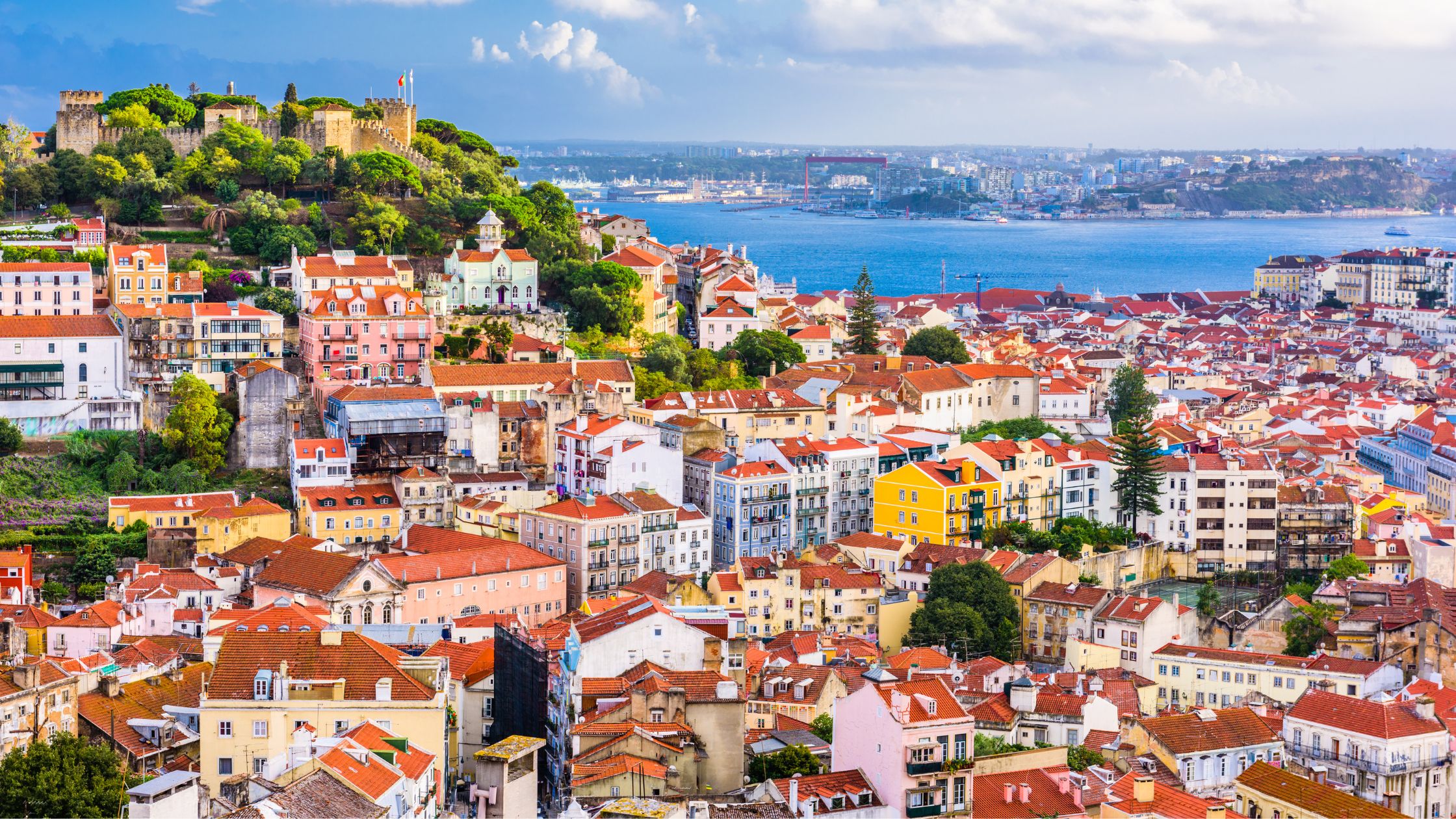Your Family Adventure Guide
Portugal has emerged as Europe’s premier family destination for 2026, offering an unmatched combination of pristine coastal experiences, tranquil lake adventures, and world-class outdoor activities that captivate people of all ages.
From the golden beaches of the Algarve, where dolphin-watching adventures thrill young explorers, to Europe’s largest lake, where you can captain your own houseboat under the world’s first certified dark sky, Portugal delivers unforgettable family memories year-round.
The country’s compact size means you can explore medieval castles, splash in water parks, kayak on volcanic crater lakes, and walk among the clouds on suspension bridges—all within a single holiday.
For 2026, Portugal has introduced new trail access systems and enhanced facilities that make planning easier while protecting the natural wonders families love to discover together.
Explore our top things to do in Portugal guide now, and get planning your itinerary!
Algarve’s coastal treasures beckon families to golden shores
The Algarve coast stands as Portugal’s crown jewel for family beach holidays, stretching over 150 kilometers of sun-drenched shoreline where warm Mediterranean waters meet dramatic limestone cliffs. Praia da Manta Rota in the eastern Algarve offers shallow waters extending remarkably far from shore, allowing young children to wade safely while parents watch and relax on golden sands. The eastern coast tends to be warmer than the Atlantic-facing western beaches, making it ideal for families with toddlers who prefer gentler swimming conditions.
For picture-perfect coastal experiences, Praia da Marinha consistently ranks among Europe’s top ten beaches with its turquoise waters, hidden grottos, and natural rock arches that spark children’s imaginations. Arrive before 9 AM during summer months to secure parking and enjoy this stunning location before crowds arrive. Nearby, Praia da Falésia near Vilamoura stretches several kilometers with flat golden sands perfect for sandcastle construction, backed by striking red-orange cliffs that create natural shade in late afternoon.
The iconic Benagil Cave—Portugal’s cathedral-like sea cave with a natural skylight opening—remains the Algarve’s most photographed attraction. Family-friendly boat tours departing from Portimão, Armação de Pêra, and Carvoeiro offer different experiences: speedboat tours (suitable for ages three and up) provide thrilling close-up views of smaller caves, while larger catamarans accommodate young children, seniors, and those prone to seasickness with covered areas and onboard bathrooms. Tours typically last 90 minutes to 2.5 hours, exploring multiple caves and rock formations along the coast. Book several days ahead during peak season, with prices ranging €25-40 per person for standard cave tours.
Dolphin-watching adventures from Lagos and Albufeira deliver 90-plus percent success rates year-round thanks to resident dolphin populations. Morning departures offer calmer seas and optimal viewing conditions. Catamaran options like Days of Adventure provide stable platforms with bathrooms and shaded areas perfect for families with young children, while speedboat tours bring you closer to the water for more interactive experiences. Marine biologists accompany many tours, transforming sightings into educational opportunities about conservation and marine ecosystems.
The Ria Formosa Natural Park near Faro and Olhão presents an entirely different coastal ecosystem—a protected lagoon system spanning 60 kilometers with barrier islands, marshlands, and saltpans that shelter over 20 bird species. Solar-powered eco-boats operated by LANDS offer silent wildlife viewing that fascinates technology-loving children, while traditional boat tours visit inhabited islands like Ilha do Farol with its charming lighthouse village and Ilha Deserta’s pristine uninhabited beaches. The calm lagoon waters provide ideal conditions for paddleboarding and kayaking, with equipment often included in longer tours.
What makes Portugal’s lakes perfect for family water adventures?
While coastal beaches draw the crowds, Portugal’s inland lakes offer families warmer waters, zero waves, and unique experiences impossible to find at the shore. Castelo de Bode, Portugal’s second-largest reservoir, has revolutionized family lake holidays with its signature floating pools—supervised swimming areas actually floating on the lake with separate sections for adults and children, complete with lifeguards. Located just 137 kilometers from Lisbon across five municipalities, this 60-kilometer reservoir on the Zêzere River maintains water temperatures significantly warmer than Atlantic beaches.
Multiple Blue Flag river beaches dot Castelo de Bode’s shores, each offering distinct character. Praia Fluvial da Castanheira (Lago Azul) ranks as the most popular, featuring those famous floating pools alongside beachfront restaurants and equipment rentals for kayaking, paddleboarding, windsurfing, and wakeboarding. The calm, wave-free environment creates perfect conditions for young swimmers and nervous beginners. Praia Fluvial da Aldeia do Mato earned both Blue Flag and Gold Quality certifications, providing full accessibility support with ramps and docking piers, making it ideal for multi-generational families. All major beaches maintain full services from June 15 through September 15, with changing rooms, showers, restaurants, and lifeguards creating worry-free days.
Lake Alqueva in sun-soaked Alentejo reigns as Europe’s largest artificial lake at 96.5 square miles, with shorelines stretching over 1,100 kilometers—longer than Portugal’s entire coastline. What truly distinguishes Alqueva is its designation as the world’s first Starlight Tourism Destination by UNESCO’s Starlight Foundation. The Dark Sky Alqueva Reserve offers over 280 cloudless nights annually with virtually zero light pollution, allowing families to witness the Milky Way, spot planets, and track constellations with naked-eye visibility.
The lake’s genius lies in combining daytime water adventures with nighttime celestial exploration. Rent autonomous houseboats that require no license after a brief safety orientation—fully equipped floating homes for 2-12 people where you captain your own adventure at a safe 10 km/h maximum speed. Prices start at €172-285 per night depending on capacity, and when split among families or groups, cost less than hotel rooms while delivering infinitely more adventure. Include canoes, kayaks, stand-up paddleboards, and gas barbecues to create your perfect floating base camp. By day, explore quiet coves and swim in warm waters; by night, anchor near whitewashed medieval villages for guided stargazing tours where children spot Saturn’s rings through professional telescopes.
Porto’s iconic 6 Bridges Cruise offers families a different river experience—a relaxing 50-60 minute journey along the Douro River aboard traditional rabelo boats that once transported Port wine barrels from vineyards to cellars. These flat-bottomed historic vessels now offer comfortable seating and audio guides in four languages as you glide beneath six distinctive bridges, including the magnificent Luís I Bridge and the Eiffel-designed Maria Pia railway bridge. Children adore the gentle motion and constantly changing views of Porto’s UNESCO-listed Ribeira district and Vila Nova de Gaia’s tiered wine cellars. At €15-20 for adults and half-price for children ages four to eleven (babies free), this represents exceptional value, especially when combined with Port wine cellar tours and hop-on-hop-off bus tickets.
Adventure trails and sky-high thrills for active families
Portugal delivers world-class outdoor adventures accessible to families willing to embrace moderate challenges. The Passadiços do Paiva—8.7 kilometers of wooden walkways hugging the Paiva River through Arouca UNESCO Global Geopark—demands good fitness with over 540 steps throughout the route, but rewards families with children aged ten and up with stunning geological formations, waterfalls, and access to three river beaches for cooling swims. Online advance booking costs just €2 per person (required for ages ten and up) through the official reservations portal, with a daily limit of 2,500 visitors ensuring the trail never feels overcrowded. Start at Areinho entrance and walk downstream to Espiunca for the easier direction, allowing 2.5-3 hours one-way.
Adjacent to the walkways, the 516 Arouca suspension bridge—one of the world’s longest pedestrian bridges at 516 meters—suspends visitors 175 meters above the wild Paiva Gorge. The €12 ticket includes access to a section of the Paiva Walkways on the same day, delivering excellent value for active families. Strictly enforced minimum age of six years, mandatory time-slot bookings, and guided crossings ensure safety while providing thrilling perspectives of Aguieiras Waterfall and the gorge below. Choose the Alvarenga entrance for an easier one-kilometer walk versus the 500-step climb from Canelas.
Peneda-Gerês National Park—Portugal’s only national park—sprawls across 69,594 hectares of mountains, valleys, pristine forests, and crystal lagoons in the country’s remote north. The park offers something for every family member: toddlers handle the easy Mata da Albergaria boardwalk through enchanted laurel forests, while adventurous teens tackle the popular Xertelo Route to Sete Lagoas (Seven Lagoons), swimming in crystal-clear mountain pools. The Arado Waterfall Trail strikes perfect middle ground—accessible by car to a bridge, then a moderate walk to a succession of waterfalls with natural swimming areas. All trails remain completely free with no advance booking required, though parking requires payment at some locations. Base yourself in Gerês village or Castro Laboreiro for authentic mountain lodging surrounded by ancient granite granaries and traditional stone villages.
Splashing into Portugal’s premier water parks and theme experiences
Slide & Splash near Lagoa in the Algarve ranks among Portugal’s largest and most established water parks, operating April through October with attractions thrilling every age group. Adults pay €32 online (€35 at the gate) while children ages four to ten cost €24, with tots under 100 centimeters enjoying free entry. The park’s signature Tropical Paradise zone caters specifically to young children with shallow water, gentle fountains, and mini-slides, while brave teens line up for Kamikaze, Tornado, and Big Fall capsule drop. The Disco River—the Algarve’s only music-and-light water slide—delivers unique sensory thrills. Arrive before 10 AM on summer days to secure free parking and prime sunbed locations, and note that unlike many European water parks, Slide & Splash welcomes families bringing their own food.
Zoomarine in Guia near Albufeira combines marine life education with entertainment through dolphin presentations, sea lion performances, birds of prey demonstrations, and an impressive aquarium housing over 8,000 animals from 500-plus species. The integrated water park zone with wave pools, slides, and splash areas means families can alternate between shows and swimming throughout a full day. Children under one meter enter free, with graduated pricing for different age groups. The park’s educational conservation focus transforms entertainment into learning opportunities about ocean ecosystems and endangered species protection.
In Lisbon, the Oceanário de Lisboa captivates families with Europe’s second-largest aquarium, featuring a dramatic five-million-liter central tank viewable from all angles showcasing Atlantic, Pacific, and Indian Ocean ecosystems. Over 8,000 marine animals include rare ocean sunfish, playful sea otters that consistently charm young visitors, and sharks gliding overhead. At €25 for adults and €15 for children ages three to twelve (under-threes free), the Oceanário delivers exceptional educational value. Combine your visit with the adjacent Telecabine Lisboa cable car for panoramic views across the Tagus River and modern Parque das Nações, with combo tickets offering modest savings.
How do Portugal’s islands create unique family adventures?
The Azores archipelago offers families volcanic landscapes impossible to experience on mainland Portugal. Sete Cidades on São Miguel Island—a massive volcanic caldera containing twin crater lakes in legendary green and blue hues—provides idyllic kayaking for all ages and abilities. Calm lake conditions with zero waves make this perfect for first-time kayakers, with sit-on-top double kayaks easily accommodating parent-child teams. Rent kayaks for approximately €21 per hour or book guided tours combining mountain biking around the crater rim with paddling between the green and blue lakes connected by a small bridge. The mystical atmosphere, frequently enhanced by drifting fog, makes this one of Portugal’s most photographically stunning family activities.
Madeira’s legendary hiking trails underwent significant changes effective January 1, 2025, continuing through 2026. All 30 official PR (Recommended Routes) trails now require advance payment of €3 per person, per trail through the Simplifica digital platform (simplifica.madeira.gov.pt), with tickets mandatory at least 24 hours before hiking. Children under twelve and Madeira residents enter free. Additionally, parking at popular trailheads like Queimadas Natural Park costs €2 per hour (€10 daily maximum) and Pico do Areeiro charges €4 per hour (€20 daily maximum), though the first 30 minutes remain free at all locations.
Despite the new fees, Madeira’s trails deliver extraordinary value—over 1,200 miles of paths through UNESCO-protected Laurisilva forests, along historic levada irrigation channels, and to dramatic mountain peaks. Family-friendly options include the short Vereda dos Balcões with its valley viewpoint perfect for young children, the enchanted Queimadas Forest Walk where moss-covered ancient trees create fairytale atmosphere, and the stunning Levada das 25 Fontes leading to a lagoon fed by 25 natural springs. More challenging routes like Pico do Areeiro to Pico Ruivo reward fit families with teenagers through tunnels carved through volcanic rock to Madeira’s highest peaks.
Exploring Lisbon, Sintra, and cultural treasures with your family
The Lisboa Card transforms Lisbon family logistics, providing unlimited metro, bus, tram, and funicular transportation plus free entry to over 51 attractions and fast-track access at 12 venues. Prices for 2026 start at €31 for adults and €21 for children (ages four to fifteen) for 24 consecutive hours, scaling to €62 adults/€35 children for 72 hours. Critically, the card includes CP train access to Sintra, Cascais, and along the Azambuja line—saving families €2.30-plus per person each direction to Sintra alone. When you factor in entries to Jerónimos Monastery, Castelo de São Jorge, Lisboa Story Centre, and multiple museum admissions plus unlimited transport, active families easily recoup costs within a single day.
Pena Palace in Sintra remains Portugal’s most photographed monument—a vibrant Romanticist castle perched atop a mountain like something from a Disney film. For 2026, the palace continues its strict timed entry system, where tickets (€20 adults for palace and park, with 15% online discount) come with mandatory 30-minute entry slots. These time slots apply specifically to palace interior access and are ruthlessly enforced—late arrivals forfeit entry with no refunds. Book the earliest available morning slot (9:30-10 AM) for minimal crowds, or choose after 3 PM when visitor numbers naturally thin. Calculate your total journey time from Lisbon, add a generous buffer for traffic through Sintra village (notorious for congestion), and remember the 30-minute uphill walk or shuttle bus ride from the park entrance to the palace entrance when planning timing.
Nearby Óbidos offers families free medieval magic—a perfectly preserved walled town where whitewashed houses cascade down cobblestone lanes and children’s imaginations soar within castle ramparts. Walk the complete circuit of medieval walls (45 minutes, though supervision is essential as sections lack railings), explore converted church bookshops in this UNESCO City of Literature, and sample famous ginjinha cherry liqueur in edible chocolate cups (adults enjoy the liqueur, kids love the chocolate vessel). The annual Medieval Market throughout July transforms the entire town with costumed reenactors, jousting tournaments, traditional crafts, and authentic medieval food, though crowds reach intense levels. Free entry makes Óbidos an exceptional value for budget-conscious families seeking authentic Portuguese culture.
Planning your family adventure: insights for maximizing your Portuguese experience
Portugal’s compact geography allows families to experience remarkable diversity within short distances—combine Lisbon’s cultural attractions with Sintra’s palaces, then transition to Algarve beaches or head north to Porto’s river cruises and onward to Peneda-Gerês mountains, all within reasonable driving distances. Spring (April through June) and autumn (September through October) deliver ideal conditions: comfortable temperatures, fewer crowds than peak summer, wildflowers carpeting hillsides in spring, and harvest celebrations in autumn. Summer, July-August, guarantees the warmest swimming conditions but brings peak tourist numbers, requiring advance bookings for popular attractions.
The introduction of capacity controls at major sites—Pena Palace timed tickets, Paiva Walkways daily limits, mandatory advance bookings for the 516 Arouca bridge, and Madeira trail fees—reflects Portugal’s commitment to sustainable tourism and the protection of natural and cultural heritage. These systems necessitate advanced planning but ensure quality experiences without overwhelming crowds. Book accommodation, rental cars, and key attractions 2-3 months ahead for summer travel.
Why Portugal wins the family adventure crown
Portugal distinguishes itself through an unmatched combination of accessibility, affordability, safety, and diversity that few European destinations can rival.
Where else can families paddle on volcanic crater lakes one day, captain their own houseboat under star-filled skies the next, and thrill on Europe’s longest suspension bridge before splashing in world-class water parks—all while enjoying Mediterranean cuisine that genuinely appeals to young palates?
The Portuguese people’s legendary warmth toward children, the country’s exceptional safety record, and the ease of navigating between dramatically different experiences create an environment where families focus on making memories rather than wrestling with logistics.
For 2026, enhanced infrastructure and thoughtful capacity management at popular sites ensure that Portugal’s natural wonders and cultural treasures remain pristine for future generations to discover.







